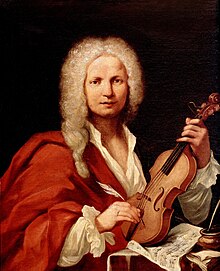
The Four Seasons is a group of four violin concerti by Italian composer Antonio Vivaldi, each of which gives musical expression to a season of the year. These were composed around 1718−1720, when Vivaldi was the court chapel master in Mantua. They were published in 1725 in Amsterdam, together with eight additional concerti, as Il cimento dell'armonia e dell'inventione.

L'estro armonico, Op. 3, is a set of 12 concertos for string instruments by Italian composer Antonio Vivaldi, first published in Amsterdam in 1711. Vivaldi's Twelve Trio Sonatas, Op. 1, and Twelve Violin Sonatas, Op. 2, only contained sonatas, thus L'estro armonico was his first collection of concertos appearing in print. It was also the first time he chose a foreign publisher, Estienne Roger, instead of an Italian. Each concerto was printed in eight parts: four violins, two violas, cello and continuo. The continuo part was printed as a figured bass for violone and harpsichord.
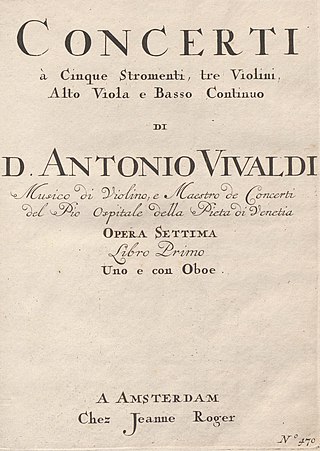
A set of twelve concertos was published by Estienne Roger in 1716-1717 under Antonio Vivaldi's name, as his Opus 7. They were in two volumes, each containing concertos numbered 1-6. Of the set, ten were for violin solo; the other two were for oboe solo. The authenticity of some of the works included has long been doubted by scholars. Three are now considered spurious for stylistic reasons. They are: No. 1 in B-flat major for oboe, RV Anh. 143 ; No. 7 in B-flat major for oboe, RV Anh. 142 ; and No. 9 in B-flat major for violin, RV Anh. 153.

La stravaganza [literally 'Extravagance'], Op. 4, is a set of concertos written by Antonio Vivaldi in 1712–1713. The set was first published in 1716 in Amsterdam and was dedicated to Venetian nobleman Vettor Delfino, who had been a violin student of Vivaldi's. All of the concertos are scored for solo violin, strings, and basso continuo; however, some movements require extra soloists.
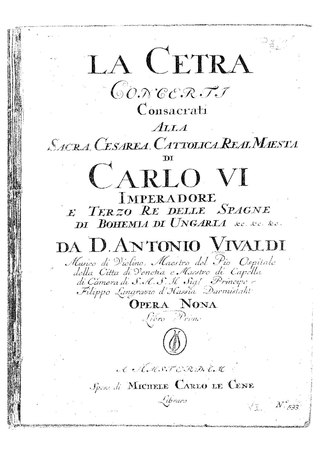
La cetra, Op. 9, is a set of twelve violin concertos by Antonio Vivaldi, published in 1727. All of them are for violin solo, strings, and basso continuo, except No. 9 in B flat, which features two solo violins. The set was named after the cetra, a lyre-like instrument, and was dedicated to Emperor Charles VI.
An organ concerto is an orchestral piece of music in which a pipe organ soloist is accompanied by an an orchestra, although some works exist with the name "concerto" which are for organ alone.

Anyone for Mozart, Bach, Handel, Vivaldi? is a CD compilation re-issue of music by the Swingle Singers. It combines tracks from two previous LP releases, Going Baroque and Swinging Mozart.
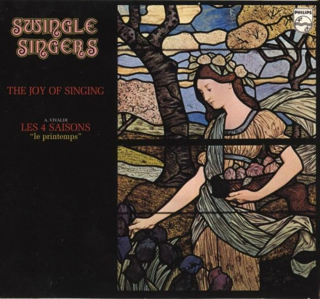
The Joy of Singing, a.k.a.Les 4 Saisons is a 1972 album by the Swingle Singers on the Philips Records label. All tracks from this album are also included on the 11 disk Philips boxed set, Swingle Singers.
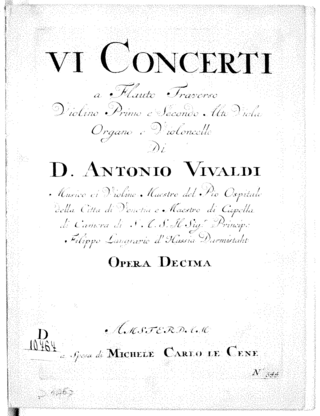
Antonio Vivaldi wrote a set of flute concertos, Op. 10, that were published c. 1728 by Amsterdam publisher Michel-Charles Le Cène.

Six Violin Concerti, Op. 6, is a set of concertos written by Antonio Vivaldi in 1712–1715. The set was first published in 1719 in Amsterdam.
- Allegro
- Grave
- Allegro
- Allegro
- Largo
- Allegro
- Allegro
- Adagio
- Allegro
- Allegro
- Adagio
- Allegro
- Allegro
- Largo
- Allegro
- Allegro
- Largo
- Allegro
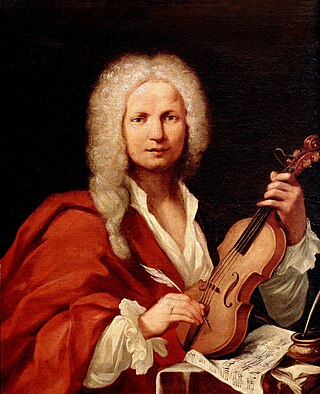
Antonio Vivaldi wrote a set of concerti for violin, strings and continuo, Op. 12, in 1729.
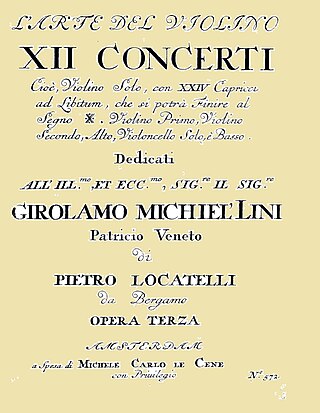
L'arte del violino is a noteworthy and influential musical composition by Italian Baroque violinist and composer Pietro Locatelli. The twelve concerti were written for solo violin, strings, and basso continuo and were published in 1733 as the composer's third opus. The virtuosic style and artistry present in the work strongly influenced violin playing in the 18th century and cemented Locatelli's reputation as a pioneer of modern violin technique.

Hooked on Classics 2: Can't Stop the Classics is an album by Louis Clark and the Royal Philharmonic Orchestra, published in 1982 by K-tel, part of the Hooked on Classics series.
Hooked on Classics 3: Journey Through the Classics is an album by Louis Clark and the Royal Philharmonic Orchestra, published in 1983 by K-tel as part of the Hooked on Classics series.
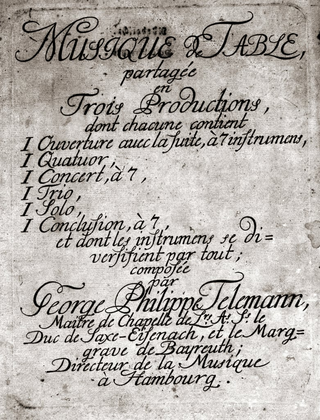
Tafelmusik is a collection of instrumental compositions by Georg Philipp Telemann (1681–1767), published in 1733. The original title is Musique de table. The work is one of Telemann's most widely known compositions; it is the climax and at the same time one of the last examples of courtly table music.

Antonio Vivaldi composed three settings of the Dixit Dominus, the Latin version of Psalm 110. They include a setting in ten movements for five soloists, double choir and orchestra, RV 594, another setting in eleven movements for five voices, five-part choir and orchestra, RV 595, and a recently discovered setting in eleven movements for five soloists, choir and orchestra, RV 807, which had been attributed to Baldassare Galuppi. It is said to be one of his "most significant sacred works."

The Concerto in C major, RV 558, otherwise known as "Concerto for Diverse Instruments" is an orchestral work by Antonio Vivaldi, written around 1740, with its premiere on the 21st of March of that year.
